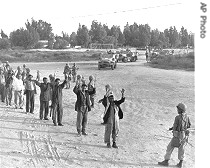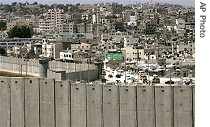-
(单词翻译:双击或拖选)
Jerusalem
05 June 2007
Forty years ago Tuesday, June 5, the 1967 Arab-Israeli War began. Lasting1 just six days, the war was an unqualified victory for Israel and a complete defeat for the armies of Egypt, Syria and Jordan. As VOA's Jim Teeple reports, nowhere did the war have a greater impact than in Jerusalem, where - 40 years later - the future of this historic city and its residents remains2 unresolved.
Gamal Abdul Nasser's voice dominated the airwaves in early June, 1967. His threats against Israel, broadcast on his Voice of the Arabs radio station, raised tensions to a fever pitch, across the region.
 |
| Israeli soldier lines up captured Egyptian troops to be checked for identification, 06 Jun 1967 |
"Jerusalem was always at the end of the highway from Tel Aviv and it was always sort of off on the periphery4. So, for three weeks, it was very unsure of what was happening and there were many memories of earlier periods of a lack of confidence in the political leadership, a hesitation5 about military power and also about international guarantees," he recalls. "I must say it became very historical, in the sense of are we alone again."
On the morning of June 5, Israel launched air strikes against Egyptian, Syrian, Jordanian and Iraqi airfields6. In the days that followed, Israeli ground forces swept into the Sinai, up the Golan Heights and eastward7 to the River Jordan, fighting their way into the heart of Jerusalem's Old City and to the Western Wall. In six days, Israeli forces defeated three Arab armies and reunified Jerusalem. Yisrael Medad says the 1967 War resolved issues left over from Israel's War of Independence in 1948.
"You could say a lot of people felt that the '67 War was the last stage of the '48 War that had never been finished," he explains. "Here, we felt what should have happened in '48 - a very strong military and uncontested victory - made clear that Israel is here to stay and we are not temporary and foreign. That was a sense of emotion that ran through many people."
For Palestinians in East Jerusalem, who had lived under Jordanian sovereignty since 1948, the 1967 War opened old wounds. Many had fled to East Jerusalem from the western part of the city in 1948. As Israeli forces swept through their neighborhoods, there was great fear. Ziad Abu Zayyad worked for the Jordanian government in 1967. Now, he publishes the Palestine-Israel Journal, which examines issues behind the Israeli-Palestinian dispute. He says it soon became clear to Palestinians that Israel was in East Jerusalem to stay.
"While Israel said, at the beginning, the occupied territories would be a deposit until the Arabs accepted to speak with Israel and negotiate with Israel, Israel started in the '70's to establish Jewish settlements all over the occupied Palestinian territories," he says. "Now, after 40 years of this occupation, I look back and I see what happened during the 40 years. I believe Israel's policy of expanding Jewish settlements in the occupied territories and changing the status and image of East Jerusalem and settling East Jerusalem with Jewish neighborhoods and building Jewish neighborhoods inside the Old City of Jerusalem - I think this policy undermines any solution to the conflict."
 |
| Palestinian refugee camp of Kalandia is seen behind section of Israel's separation barrier near West Bank city of Ramallah, 04 Jun 2007 |
"No one should underestimate Israeli security fears and concerns. But, at the same time, Israel is using the wall to annex10 Arab territories. If Israel wants to wants to build a wall along the 1967 borders - the fourth of June borders - then there is no objection. But, when they build this wall in the heart of the West Bank, annexing11 thousands of dunams (hectares) from the West Bank, this is not accepted. The wall in Jerusalem is not dividing the Jews from the Arabs or the Israelis from the Palestinians. It is dividing Arabs from Arabs. You see the wall going through between the houses like a snake, separating a brother from his brother."
Israel says Jerusalem is its eternal capital and will never be divided again. Palestinians say East Jerusalem must be the capital of their future state.
Forty years after Israeli troops conquered East Jerusalem, the city is governmentally unified8. But it remains solidly divided between two peoples.
 收听单词发音
收听单词发音
1
lasting

|
|
| adj.永久的,永恒的;vbl.持续,维持 | |
参考例句: |
|
|
|
2
remains

|
|
| n.剩余物,残留物;遗体,遗迹 | |
参考例句: |
|
|
|
3
shipping

|
|
| n.船运(发货,运输,乘船) | |
参考例句: |
|
|
|
4
periphery

|
|
| n.(圆体的)外面;周围 | |
参考例句: |
|
|
|
5
hesitation

|
|
| n.犹豫,踌躇 | |
参考例句: |
|
|
|
6
airfields

|
|
| n.(较小的无建筑的)飞机场( airfield的名词复数 ) | |
参考例句: |
|
|
|
7
eastward

|
|
| adv.向东;adj.向东的;n.东方,东部 | |
参考例句: |
|
|
|
8
unified

|
|
| (unify 的过去式和过去分词); 统一的; 统一标准的; 一元化的 | |
参考例句: |
|
|
|
9
bombers

|
|
| n.轰炸机( bomber的名词复数 );投弹手;安非他明胶囊;大麻叶香烟 | |
参考例句: |
|
|
|
10
annex

|
|
| vt.兼并,吞并;n.附属建筑物 | |
参考例句: |
|
|
|
11
annexing

|
|
| 并吞( annex的现在分词 ); 兼并; 强占; 并吞(国家、地区等) | |
参考例句: |
|
|
|















